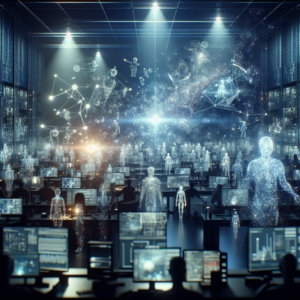Please Stop Inviting AI Notetakers to Meetings
In today’s fast-paced business environment, the use of technology has become indispensable. From cloud computing to artificial intelligence (AI), it is evident that innovation is reshaping the way we conduct our daily operations. Among these advancements, AI notetakers have emerged as a popular tool for enhancing productivity in meetings. However, there is a growing sentiment that these digital assistants are not the panacea they are often marketed to be. In fact, many professionals are calling for an end to their use in meetings altogether.
The Illusion of Efficiency
At first glance, AI notetakers seem to offer a range of benefits. They promise to record conversations, summarize discussions, and even highlight key action items, all while eliminating the need for human notetakers. However, the reality is that the efficiency these tools claim to provide is often an illusion.
When AI notetakers enter the room, they bring with them a host of complications. For starters, the technology can be prone to misinterpretation. Conversations are nuanced, filled with sarcasm, humor, and emotional undertones that machines struggle to comprehend. As a result, critical points can be lost, leading to confusion and miscommunication.
Moreover, the presence of AI notetakers can inadvertently inhibit genuine human interaction. Participants may feel less inclined to engage in meaningful discussions if they know a machine is “listening.” This can stifle creativity and limit the depth of conversation.
Data Privacy Concerns
Another major drawback of AI notetakers is the significant risk they pose to data privacy. When sensitive information is shared during meetings, it is imperative that this data remains confidential. However, AI notetakers often store records in the cloud, making them vulnerable to breaches and unauthorized access.
The notion that a third-party application is privy to internal discussions can lead to serious security concerns. Employees may become hesitant to share their thoughts or voice concerns, limiting transparency and fostering a culture of distrust. As organizations continue to prioritize data protection, the use of AI notetakers may create more problems than it solves.
Dependence on Technology
In an age where technology dominates many aspects of our lives, the reliance on AI notetakers can exacerbate our dependence on machines. Meetings transformed into data collection sessions may lead to a decline in critical thinking and interpersonal skills.
Instead of fostering an environment where individuals contribute their thoughts and ideas freely, organizations may inadvertently facilitate a culture where employees lean heavily on technology to fill in the gaps. Over time, this can lead to a workforce that lacks the ability to articulate ideas clearly or engage in constructive debate.
The Human Element
While AI notetakers may promise efficiency and ease, they can never replace the irreplaceable human element in meetings. Human notetakers not only record information but also assess the emotional and social dynamics of discussions. They can gauge the mood of the room, recognize when participants are disengaged, and ensure that everyone has a voice.
Creating a collaborative environment requires empathy and understanding—qualities that AI simply cannot replicate. Investing in human facilitators who can guide conversations and encourage participation is far more beneficial than relying on a machine to do the heavy lifting.
The Role of AI in Supporting Human Notetaking
While the outright rejection of AI notetakers may seem extreme, it is essential to recognize that technology can still play a valuable role in supporting human notetakers. Rather than fully replacing human involvement, AI can assist in transcription or organizing notes post-meeting. This hybrid approach allows for the best of both worlds, combining the efficiency of technology with the emotional intelligence of human facilitators.
For example, organizations can utilize AI to transcribe meetings after they conclude, allowing human notetakers to focus on facilitating discussions in real-time. This ensures that critical conversations are not lost while still maintaining the interpersonal dynamics that are vital to productive meetings.
Conclusion: Rethinking the Role of AI in Meetings
As we navigate an increasingly digital world, it is crucial to critically assess the tools we integrate into our workflows. AI notetakers may seem like a modern solution to a common problem, but their limitations and potential drawbacks can outweigh their advantages.
We must prioritize human interaction and meaningful engagement in meetings, recognizing that technology should be used to bolster—not replace—human capabilities. Therefore, it is time to reconsider the role of AI notetakers in our professional lives. Emphasizing human involvement in discussions will foster collaboration, creativity, and trust, ultimately leading to more productive outcomes.
In conclusion, while AI notetakers may have their place in the technology landscape, they should not be viewed as a one-size-fits-all solution for modern meetings. By prioritizing the human element, we can create environments where people feel empowered to share their thoughts and ideas freely, leading to a more innovative and collaborative workplace.



